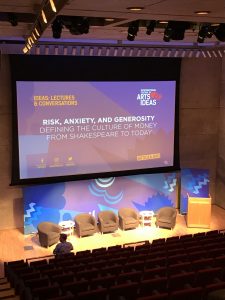
The stage awaits…
I’m an enthusiast, and I enjoy all manner of academic events, from specialist conferences on Thomas Nashe to public round-tables for World Oceans Week. But it’s rare to be part of an event that draws all its threads together as powerfully as did last night’s Risk, Anxiety, and Generosity panel for New Haven’s Festival of Arts and Ideas.
Part of the joy for me was bringing together many different perspectives in and beyond academia, including various kinds of expertise and — not least, though perhaps not as clearly known by everyone in the auditorium — different phases of my own life. Starting with a two hour lunch-as-seminar pregame in my living room yesterday afternoon and extending through a leisurely dinner at our favorite local place on Chapel Street, it really was an ideal event. I’m so pleased the Festival helped us put it on!
There’s a full recording on Facebook live video on my public FB page and on the Festival’s page, and I think after a few weeks it’ll be archived on the Arts & Ideas website. (I’ll update this post with a permanent link when it’s available.)
In today’s afterglow I’ll sketch out more personal introductions to the four amazing people who shared the stage with me last night. Bios and links are on the Arts & Ideas page, and of course google knows all these folks very well. But the group also comprises my own shadow biography, and bringing them together last night brought together fragments of my past selves, from my rugby playing college days to more recent stints as Dad and academic advisor. I’ll re-introduce them here in the order in which I met them, starting more than 30 years ago.
 I met Erik Blachford in fall or winter of 1985-86, when we were classmates in our first year of college. We played rugby together and were both English majors with creative interests: Erik remains an actor and theater person, and I did creative writing. But when I took a post-college academic turn, Erik headed off to Microsoft in Seattle, where he was part of the group that founded Expedia.com, for which he later served as CEO as part of his distinguished Silicon Valley / dot.com career. He gave our event the venture capital take on risk, and the perspective of someone who’s seen companies thrive or fail in rapid succession.
I met Erik Blachford in fall or winter of 1985-86, when we were classmates in our first year of college. We played rugby together and were both English majors with creative interests: Erik remains an actor and theater person, and I did creative writing. But when I took a post-college academic turn, Erik headed off to Microsoft in Seattle, where he was part of the group that founded Expedia.com, for which he later served as CEO as part of his distinguished Silicon Valley / dot.com career. He gave our event the venture capital take on risk, and the perspective of someone who’s seen companies thrive or fail in rapid succession.
I’m not sure at what point in my career as academic Shakespearean I first met Holly Dugan, who teaches at George Washington University in DC, but probably in the early ’00s. She’s one of my favorite people to see every year at the Shakespeare Association of America’s annual meeting. I was especially eager to have her join the Merchant panel because I know she’s been collaborating with GWU’s Business School and teaching undergrad business students. In the panel, she spoke eloquently about utopian spaces from the classroom to the Rialto, and she also explored the way this play forecloses the hopes raised by such spaces. She also talked compellingly about how teaching such difficult plays beyond our home-team audience of lit majors can enliven and expand our senses of why great art matters in the world.
 I met Judy Chevalier, a professor of economics and finance at the Yale School of Management, through my son, who has been going to school with her son since both of them were little kids. It’s been a somewhat sideways way to enter into a professional conversation; I’m pretty sure that almost the entirety of the first couple years of our dialogue was about pick-up and drop-off times and each of us checking that our son had not overstayed his welcome at the other’s house. (I don’t think either ever did; I know we loved having Judy’s son with our family for part of our beach vacation last week.) Her perspective as a professor of Economics and Finance connected Shakespeare’s dramatic presentation of usury and dealmaking with longer histories of money and culture in and beyond Europe. She helped conclude our session with a brilliant exploration of why the Venetian state feels compelled to uphold the bond even when it clearly does not want to — her ringing description of the state’s role in structuring and enforcing legal contracts was one of several moments in our conversation that felt somewhat ripped from this year’s headlines.
I met Judy Chevalier, a professor of economics and finance at the Yale School of Management, through my son, who has been going to school with her son since both of them were little kids. It’s been a somewhat sideways way to enter into a professional conversation; I’m pretty sure that almost the entirety of the first couple years of our dialogue was about pick-up and drop-off times and each of us checking that our son had not overstayed his welcome at the other’s house. (I don’t think either ever did; I know we loved having Judy’s son with our family for part of our beach vacation last week.) Her perspective as a professor of Economics and Finance connected Shakespeare’s dramatic presentation of usury and dealmaking with longer histories of money and culture in and beyond Europe. She helped conclude our session with a brilliant exploration of why the Venetian state feels compelled to uphold the bond even when it clearly does not want to — her ringing description of the state’s role in structuring and enforcing legal contracts was one of several moments in our conversation that felt somewhat ripped from this year’s headlines.
I think my most recent acquaintance on the panel was Dr. Tara Bradway, a recent English PhD graduate from St. John’s who was a student in my “Intro to the Profession” class very early in my time as Director of Graduate Studies, probably around 2011. She’s a brilliant performer as well as researcher and writer, and I designed the format of our presentation with her acting gifts in mind. As she has been demonstrating for the past several years in her striking dissertation, “The Actor as Critic,” she showed all of us yesterday the particular insights a working actor can provide that sometimes other readers avoid or brush past. Arguing for an in-the-moment Portia who is surprised into the “quality of mercy” speech through her own argumentative error, Tara helped us uncover a more human heiress than sometimes textual analysis produces.
[To round out the hidden ties among the family of our panel with a slightly Jane Austen-ish note, I’ll also mention that Erik and I are married to two inspiring women who grew up together in Mill Valley, CA, and have been friends since the second grade — and whose professional perspectives as trial lawyer and ex-VP of Site Development at amazon.com might have added much to our conversation about Merchant, had there been more room on stage!]
Together we talked about risk through the emergence of financial and political institutions and in terms of decisions about venture capital in Silicon Valley today.
We explored anxiety by thinking about the often masterless young men and women who overpopulated Shakespeare’s London and the precarious futures facing the rising generation of today’s America.
We imagined generosity as a semi-magical attribute of Portia’s limitless wealth, as a means to shift from a logic of scarcity to one of abundance, and — in dialogue with a great last question about Antonio’s lost-then-found ships from Mike Shea — a short-circuiting of the structuring mechanisms of the play.
Such a pleasure to think, talk, and imagine with so many brilliant and generous people! I want to bring everyone back to the Festival again next June!
Thanks to everyone who came out, everyone who asked questions (including Jeff Sonnenfeld of Yale’s School of Management, who started us off with a rousing attack on Portia as faux-Trumpian fraud), and all who watched the livestream! Hope to see you at the performance in New Haven this week!